As competition (or even conflict) with Russia and China deepens, the US may see an advantage in returning democracy and human rights promotion to the first tier of policy instruments as an asymmetric wedge to wield against the Putin and Xi regimes, according to a new study.
The United States has not abandoned the enterprise of advancing democracy, since Congress has continued to provide substantial and growing funding to the constellation of democracy-promotion groups, including the National Endowment for Democracy (NED), International Republican Institute, National Democratic Institute, and other affiliates, note analysts Hal Brands, Peter Feaver, and William Inboden.*
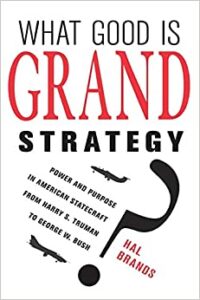 The US prefers having democratic allies and partners over nondemocratic allies and partners. Indeed, President Biden has multiple times framed the current geopolitical era as a contest between democracy and authoritarianism. This is not altogether wrong, just incomplete, they contend in Stress Testing American Grand Strategy II: Critical Assumptions and Great Power Rivalry, a report for the American Enterprise Institute, which subjects 17 critical assumptions underpinning US grand strategy to an intellectual stress test.
The US prefers having democratic allies and partners over nondemocratic allies and partners. Indeed, President Biden has multiple times framed the current geopolitical era as a contest between democracy and authoritarianism. This is not altogether wrong, just incomplete, they contend in Stress Testing American Grand Strategy II: Critical Assumptions and Great Power Rivalry, a report for the American Enterprise Institute, which subjects 17 critical assumptions underpinning US grand strategy to an intellectual stress test.
While a hedged and ambivalent commitment to democracy promotion will likely continue as an American strategic assumption, a number of factors could complicate it or cause it to be either revived or jettisoned entirely, they add, highlighting two of these factors:
- First, a possible new wave of activism and democratic movements, similar to the Latin American and Asian transformations of the 1980s, Eastern European transitions of the 1990s, and Arab Spring protests in the 2010s, could compel an American recalibration to return to democracy support as a first-tier priority. (There are few indications that such a global wave is forthcoming, but neither should it be ruled out entirely, as the peaceful protest movements in recent years in places such as Belarus, Hong Kong, Iran, Sudan, Venezuela, and elsewhere serve to remind).
- Second, a potential outbreak of war in regional flash points, such as a Chinese attack on Taiwan or use of force by Israel and the US against Iran, could also affect democracy promotion’s place in the hierarchy of policy priorities. Yet this effect is hard to predict:
-
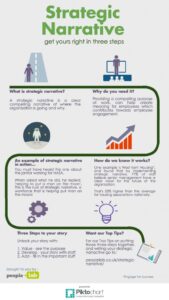 On the one hand, the strategic imperatives of military action might cause the US to further sideline democracy and deepen cooperation with authoritarian or quasi democratic regimes that share America’s aversion to the enemy. In the case of conflict with China, such partners could include the Philippines, Singapore, Thailand, and Vietnam; in the case of Iran, they could include Egypt, Saudi Arabia, Qatar, Turkey, and the UAE.
On the one hand, the strategic imperatives of military action might cause the US to further sideline democracy and deepen cooperation with authoritarian or quasi democratic regimes that share America’s aversion to the enemy. In the case of conflict with China, such partners could include the Philippines, Singapore, Thailand, and Vietnam; in the case of Iran, they could include Egypt, Saudi Arabia, Qatar, Turkey, and the UAE.- Conversely, as the American competition (or even conflict) with Russia and China deepens, the US may see an advantage in returning democracy and human rights promotion to the first tier of policy instruments as an asymmetric wedge to wield against the Putin and Xi regimes. Both leaders, it should be noted, fear their own citizens more than they fear any outside power. And for an American grand strategy to be sustainable and maintain popular support over the long term, it needs to include a values component that resonates with the American people and inspires a sense of solidarity and shared sacrifice.
-
Dr. Brands and Dr. Charles Edel recently laid out 8 pillars crucial for defending the world’s democracies from rising authoritarianism in an article in The Washington Quarterly, “A Grand Strategy of Democratic Solidarity,” with discussant Dr. Kori Schake and moderator Abraham Denmark (see below).
But “you cannot rally sustained bipartisan support for a pro-democracy grand strategy if you’re constantly linking this strategy to your conflict with your domestic political opponents. Or, for that matter, if you’re constantly linking it to values that are the province of only your own political coalition,” argues New York Times commentator Ross Douthat. “A grand strategy that equates democracy simplistically with social liberalism or progressivism is never going to get sustained buy-in,” he contends.
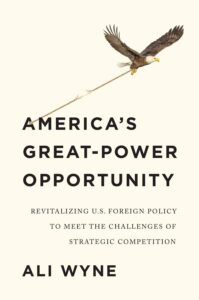 “Democratic clubbism”
“Democratic clubbism”
At a time when wealth, power, and technology are increasingly diffused from West to East and North to South, can a limited democracy-versus-authoritarianism approach fashion a stable and prosperous world order as that which evolved after World War II? observers ask.
In a thoughtful paper, the Carnegie Endowment’s Stewart Patrick describes the upsides and downsides of various types of multilateralism — charter (UN), club, concert, and coalition. Patrick defines the Biden administration’s emphasis on democratic solidarity as “clubbism,” note analysts Mathew Burrows and Robert A. Manning.
The like-minded “clubbist” redefinition of multilateralism — an alliance of democracies — has limited appeal beyond the West, they write for The Stimson Center. The Global South does not want to be aligned with either the United States or the China-Russia camp but seeks good relations with all major powers to increase its leverage. This explains the Global South’s rejection of isolating Russia despite its condemnation of Russian President Vladimir Putin’s invasion, as well as Riyadh’s dealing with Beijing to renew ties with Tehran.
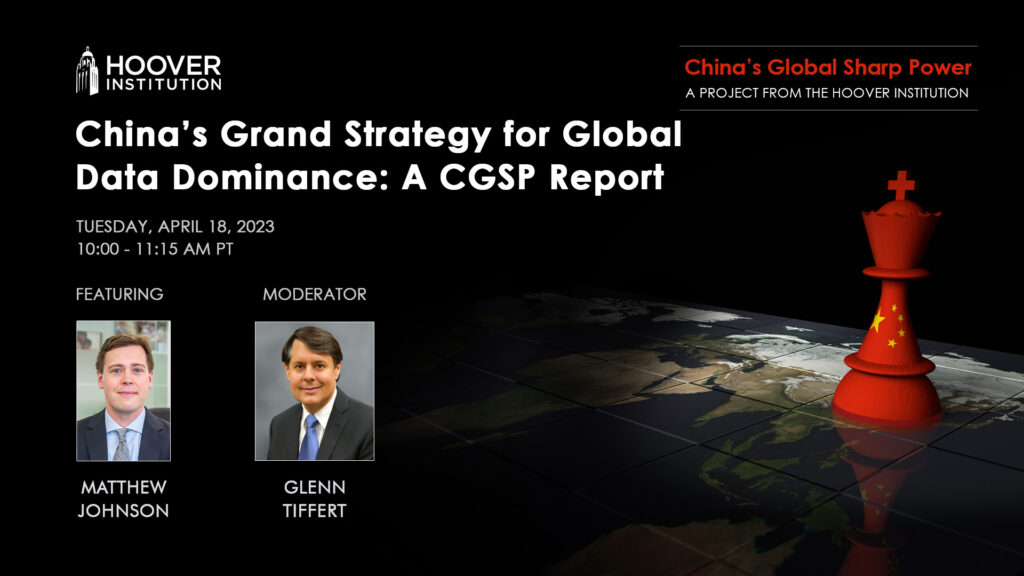 China is engaged in a bid to shape how digitized information – data – will be distributed and controlled around the world for the foreseeable future, the Hoover Project on China’s Global Sharp Power reports. Xi Jinping’s Party-state is building a massive institutional architecture to maximally exploit data as the fundamental resource of the future global economy and governance system. In his new report, “China’s Grand Strategy for Global Data Dominance,” Matt Johnson proposes robust policy solutions to arrest the exposure of huge swaths of the world’s population to the CCP’s data accumulation, espionage, and manipulation.
China is engaged in a bid to shape how digitized information – data – will be distributed and controlled around the world for the foreseeable future, the Hoover Project on China’s Global Sharp Power reports. Xi Jinping’s Party-state is building a massive institutional architecture to maximally exploit data as the fundamental resource of the future global economy and governance system. In his new report, “China’s Grand Strategy for Global Data Dominance,” Matt Johnson proposes robust policy solutions to arrest the exposure of huge swaths of the world’s population to the CCP’s data accumulation, espionage, and manipulation.
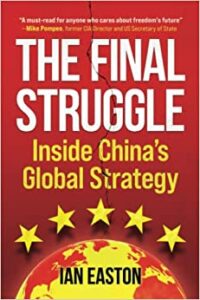 The Hoover Project on China’s Global Sharp Power invites you to China’s Grand Strategy for Global Data Dominance: A CGSP Report on Tuesday, April 18, 2023 at 10:00 – 11:15 AM PT. RSVP
The Hoover Project on China’s Global Sharp Power invites you to China’s Grand Strategy for Global Data Dominance: A CGSP Report on Tuesday, April 18, 2023 at 10:00 – 11:15 AM PT. RSVP
On April 11, USIP hosted a conversation (above) with Andrew Monaghan on what Russian grand strategy entails, how it manifests in the political, economic, and military spheres, and what this means for the United States and the future of global conflict in the era of great power competition.
The collective results of Moscow and Beijing putting their proverbial thumbs on the scale to favor authoritarianism while Washington has eased its thumb from the scale favoring democracy has been a substantial net increase in outside actors fueling dictatorship and illiberalism, the AEI report observes. Combined with the indigenous forces and factors corroding democracy in individual countries, it is no wonder free societies have diminished in number.
*Hal Brands is the Henry A. Kissinger Distinguished Professor of Global Affairs at the Johns Hopkins School of Advanced International Studies, and author of The Twilight Struggle: What the Cold War Teaches Us About Great-Power Rivalry Today and Danger Zone: The Coming Conflict with China. Peter Feaver is a professor of political science and public policy at Duke University and coauthor with Christopher Gelpi and Jason Reifler of Paying the Human Costs of War: American Public Opinion and Casualties in Military Conflicts. William Inboden is executive director and William Powers Jr. Chair of the University of Texas at Austin Lyndon B. Johnson School’s Clements Center for National Security, and author of The Peacemaker: Ronald Reagan, the Cold War, and the World on the Brink.







